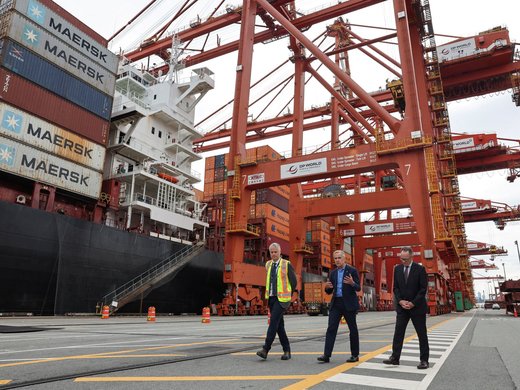WATERLOO, Ont. – Today, the Centre for International Governance Innovation (CIGI) unveils a new focal point of its research that explores the role of innovation in driving productivity performance and the potential impact of the intellectual property provisions in mega-trade agreements – such as the Trans-Pacific Partnership and the Canada-European Union Comprehensive Economic and Trade Agreement – in facilitating or hindering productivity growth.
CIGI’s research in this area under its Global Economy Program will address the shift from the removal of trade barriers, such as tariffs and other import charges, to establishing a global intellectual property framework. The structure of these new agreements will be critical in determining whether businesses in open mid-sized advanced economies, such as Canada, can remain competitive in the global economy.
“International trade agreements generally provide a boost to global economic growth, but they must also provide sufficient safeguards to foster innovation, and CIGI’s research will focus on this important aspect of international trade,” says Domenico Lombardi, director of CIGI’s Global Economy Program.
This research will contribute to the discussion on how to create a policy environment that can allow Canada’s innovation sector to thrive. It builds upon work already underway in CIGI’s International Law Research Program (ILRP) in international economic law and international intellectual property law and innovation, which aims to increase understanding and develop policy guidance and tools for success in the global knowledge economy.
As part of this initiative, CIGI announced senior fellow appointments for three leading experts on the impact of international trade agreements on innovation.
“We are pleased to welcome Dan Ciuriak, Dieter Ernst and Olena Ivus and to further their work in a research area that is key to Canada’s ability to compete internationally,” Lombardi says. “Their work on the impact of trade agreements on innovation and intellectual property rights will help to move forward CIGI’s new focus on innovation and trade.”
Ciuriak will focus on the intersection between Canada's domestic innovation and international trade and investment, including the development of better metrics to assess the impact of Canada's trade agreements on innovation outcomes.
Ernst will explore a number of challenges related to the global governance of trade, intellectual property and innovation, including coping with requirements of increasingly complex and diverse global corporate networks of production and innovation – as well as the effects of the proliferation of strategic patenting behavior.
Ivus will focus on the relationship of Canada’s intellectual property rights regulations with innovation and foreign trade, exploring how IP protections and foreign trade policy can help promote competitiveness of Canadian firms abroad.
Curiak, Ernst and Ivus join other CIGI experts working in the innovation and productivity space, aiming to contribute to the discussion on how to create a policy environment that can allow Canada’s innovation sector to thrive. They include Joël Blit, a CIGI senior fellow since May 2015, who is researching the topic of innovation, IP, immigration and trade, focusing on Canada as an example for the global economy; and Bassem Awad, deputy director of the ILRP and theme leader of International IP and Innovation, who is focused on best practices policy regulation for climate change technology innovation in Canada.
MEDIA CONTACT:
Andi Balla, Communications Specialist, Global Economy, CIGI
Tel: 519.885.2444 ext. 7205, Email: [email protected]
The Centre for International Governance Innovation (CIGI) is an independent, non-partisan think tank on international governance. Led by experienced practitioners and distinguished academics, CIGI supports research, forms networks, advances policy debate and generates ideas for multilateral governance improvements. Conducting an active agenda of research, events and publications, CIGI’s interdisciplinary work includes collaboration with policy, business and academic communities around the world. CIGI was founded in 2001 by Jim Balsillie, then co-CEO of Research In Motion (BlackBerry), and collaborates with and gratefully acknowledges support from a number of strategic partners, in particular the Government of Canada and the Government of Ontario. For more information, please visit www.cigionline.org.
-30-


